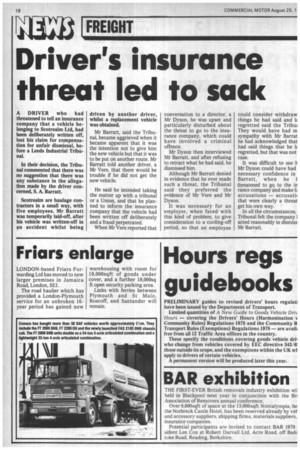Driver's insurance threat led to sack
Page 20

If you've noticed an error in this article please click here to report it so we can fix it.
A DRIVER who had threatened to tell an insurance company that a vehicle belonging to Scotrealm Ltd, had been deliberately written off, lost his claim for compensation for unfair dismissal, before a Leeds Industrial Tribunal.
In their decision, the Tribunal commented that there was no suggestion that there was any substance in the allegation made by the driver concerned, S. A. Barratt.
Scotrealm are haulage contractors in a small way, with five employees. Mr Barratt was temporarily laid-off, after his vehicle was written-off in an accident whilst being driven by another driver, whilst a replacement vehicle was obtained.
Mr Barratt, said the Tribunal, became aggrieved when it became apparent that it was the intention not to give him the new vehicle but that it was to be put on another route. Mr Barratt told another driver, a Mr Vere, that there would be trouble if he did not get the new vehicle.
He said he intended taking the matter up with a tribunal or a Union, and that he planned to inform the insurance company that the vehicle had been written off deliberately and a fraud perpetrated.
When Mr Vere reported that conversation to a director, a Mr Dyson, he was upset and particularly disturbed about the threat to go to the insurance company, which could have involved a criminal offence.
Mr Dyson then interviewed Mr Barratt, and after refusing to retract what he had said, he dismissed him.
Although Mr Barratt denied in evidence that he ever made such a threat, the Tribunal said they preferred the evidence of Mr Vere and Mr Dyson.
It was necessary for an employer, when faced with this kind of problem, to give consideration to a cooling-off period, so that an employee could consider withdraw things he had said and lz regretted said the Tribui They would have had m sympathy with Mr Barrat he had acknowledged that had said things that he lz regretted, but that was not case.
It was difficult to see 1. Mr Dyson could have had necessary confidence in Barratt, when he 1 threatened to go to the in rance company and make accusations — accusatii that were clearly a threat get his own way.
In all the circumstances, Tribunal felt the company I acted reasonably in dismiss Mr Barratt.




































































































